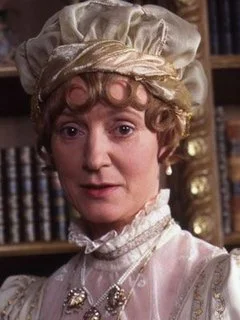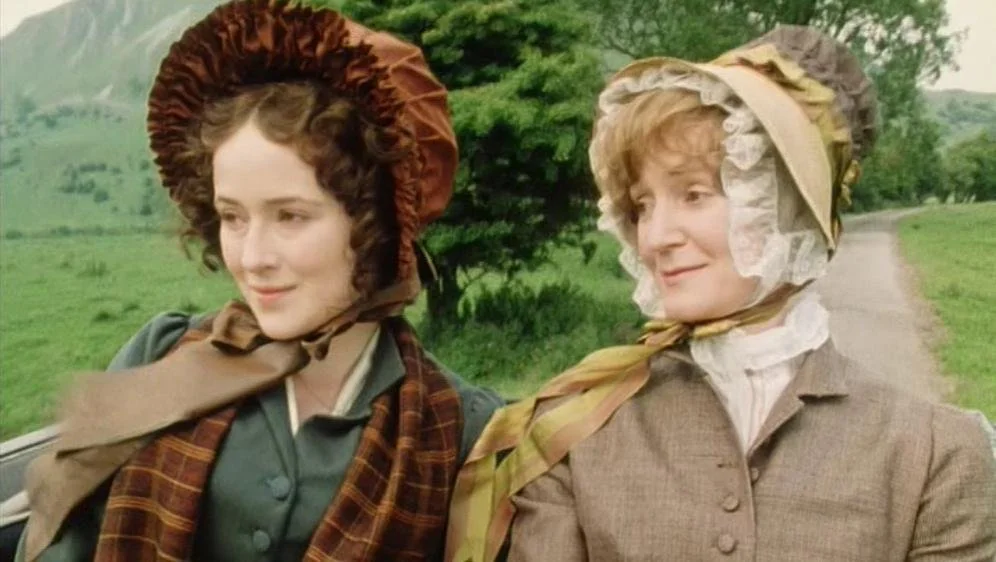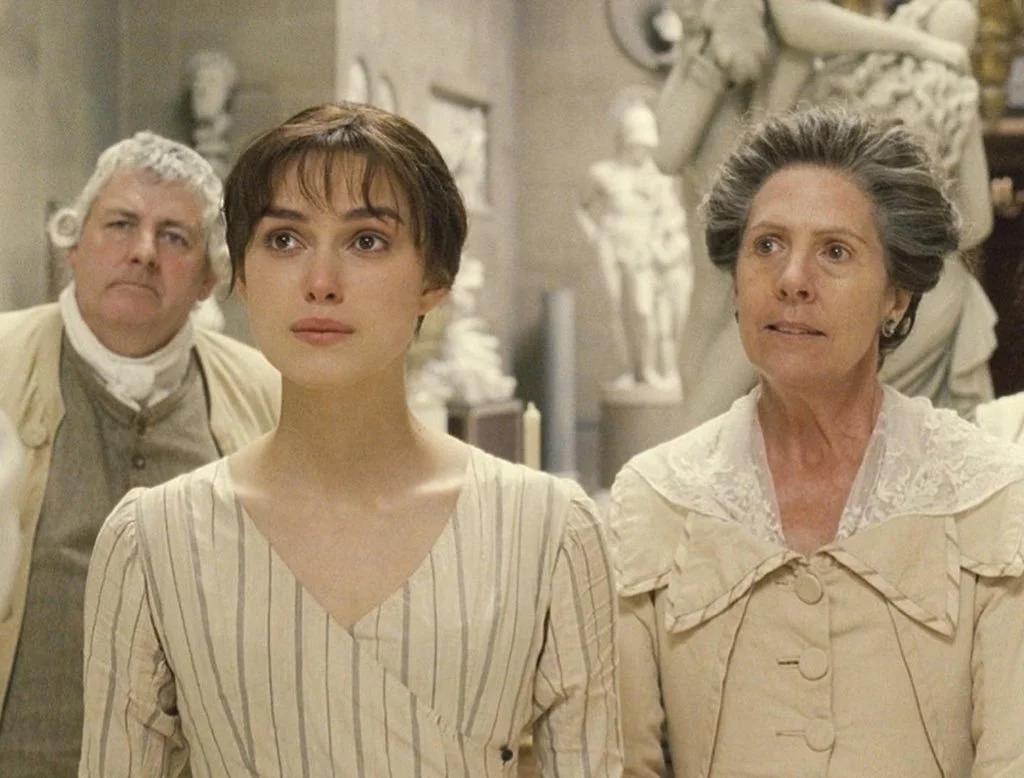MRS. GARDINER IS THE PERFECT EXAMPLE OF A REGENCY WISE WOMAN. SHE IS BOTH ADVISOR AND GUIDE TO ELIZABETH BENNET.
Podcaster Izzy Meakin discusses Mrs. Gardiner’s role as the ‘Wise Woman’ in Pride and Prejudice.
The Wise Woman is one of literature’s oldest, and arguably most adaptable archetypes. The Wise Woman is knowledgeable, compassionate, intuitive, and possesses practical skills to help the protagonist. In some instances, she is magical. In others, it is her effect on the text that is the real magic. This archetype has endured the test of time because of the significant role she plays in supporting the protagonist, so they reach their highest potential.
The first representation of the Wise Woman falls to the Greek Goddess Hecate. Known to many as the protector of witchcraft and divination, her most notable story involves her escorting Demeter through the underworld to find her daughter, Persephone. Later Hecate would transition from guide to advisor, supporting Persephone to navigate married life with Hades. The archetype’s imagery would later be mortalized as a magical entity under the title Fairy Godmother seen in Perrault’s rendition of Cinderella. This magical entity becomes more morally ambiguous in the character of the Witch that was particularly favoured in Renaissance texts, such as in Shakespeare’s Macbeth. Yet, as time passes, and the perception of cunning women is adjusted to match the rise in women’s rights, the Wise Woman’s morals are redeemed in characters like Baum’s Glinda the Good Witch, Tolkien’s Elven Queen Galadriel, and Travers’ Mary Poppins. Despite often living a solitary life, the Wise Woman possesses maternal energy, is supportive and intuitive, and, arguably most important, she continues to challenge the protagonist when needed and holds them to a higher standard of themselves.
Wise Women throughout the years (Left to right, Glinda, Mary Poppins, Galadriel)
Mrs. Gardiner represents Jane Austen’s Regency’s depiction of the Wise Woman. A more subtle portrayal than that of fantasy authors and one more tangible than the earliest depictions in Greek mythology. No longer solitary or a magical practitioner, Austen’s Wise Woman blends into the patriarchal society of the 19th Century and navigates it effortlessly. A woman fit for Regency England, she is as Mrs. Gardiner is described an “amiable, intelligent, elegant woman” and, maybe most appropriate for this time, married or widowed. Yet, she also has the intuition and cunning of the more fantasy-based characters such as the fairy or witch. The Wise Woman as Yang writes, seeks to “guide the other characters to a better understanding of themselves and their relationship to society.” On this account, Mrs. Gardiner is the perfect example of a Regency Wise Woman. She is both advisor and guide to Elizabeth Bennet, challenges her when needed, and mentors her as she navigates the marriage market. A closer reading of the text should help to disclose this.
Mrs. Gardiner, Pride and Prejudice (1995)
One of the first instances where Mrs. Gardiner embraces her role as the Wise Woman is when she challenges Elizabeth and expects sagacity in Lizzy’s intimacy with Mr. Wickham. Recognizing that a match with Wickham would be “imprudent” she urges her to “discourage” his attentions. She questions Lizzy’s encouragement of their friendship and states, “You must not let your fancy run away with you. You have sense, and we all expect you to use it.” Specifying “sense” something she knows Lizzy prides herself on having, Mrs. Gardiner reminds Lizzy of her duty to herself and her father.
“Your father would depend on your resolution and good conduct, I am sure. You must not disappoint your father.”
Lizzy and Mrs. Gardiner tour Northern England, Pride and Prejudice (1995)
Mrs. Gardiner’s method as advisor and mentor is tailored to her target, playing on sense and Lizzy’s commitment to Mr. Bennet keeps our heroine on the straight and narrow. As Dale describes “when the Wise Woman has confidence in her knowledge and wisdom, she takes up the role of mentor and teacher.” Austen later confirms Mrs. Gardiner’s skill as a mentor stating, it was “a wonderful instance of advice being given on such a point without being resented.” Furthermore, compared to others in Meryton, Lizzy’s aunt has instant reservations about Wickham, and when the idea of a prudent marriage doesn’t deter Lizzy from her friendship, she seeks to find Wickham to be a fortune hunter.
Discreetly prophetic, Mrs. Gardiner leads from intuition, both things characteristic of the earlier Wise Woman. Being one of the first to speculate that Wickham may be a “mercenary”, drawn to the fortune of Miss Mary King, Mrs. Gardiner's conversation with Elizabeth foreshadows the exposure of Wickham’s true character. Although the accusations threaten Elizabeth's judgment, the conversation is enough to finally distance Elizabeth from Wickham declaring, “I have never been much in love.” With this open mind, Mrs. Gardiner is strategic in inviting Elizabeth on a Northern tour of England. Lizzy’s spirits rise, and the chance for an adventure away from Longbourne becomes a much more appealing alternative, after all, “what are men to rocks and mountains?” Mrs. Gardiner is the one to initiate the change of scene which will lead to Elizabeth reuniting with Darcy after his first proposal. Mrs. Gardiner continues to successfully lead Elizabeth toward a more advantageous match.
Lizzy Bennet with her aunt and Uncle at Pemberley, Pride and Prejudice (1995)
It could be argued that Mrs. Gardiner’s cunning is briefly exposed at Pemberley in a hint of self-awareness. When Mr. Darcy’s Housekeeper paints an unflattering image of Wickham, we see conscious gratification from Mrs. Gardiner: “‘[Wickham] is now gone into the army’, she added; ‘but I am afraid he has turned out very wild.’ Mrs. Gardiner looked at her niece with a smile.” The smile from Mrs. Gardiner can be seen as one of humour upon hearing the boasting of a devout housekeeper, or alternatively can be seen as pleasant confirmation that Mr. Wickham is not the innocent victim he proclaimed, and her previous opposition to Lizzy forming an attachment to him was just.
A subsequent passage in the narrative shows that the two characters are in tangent, Elizabeth recognizes Mrs. Gardiner as the adviser, and later she is very happy to take up that role: “Elizabeth was longing to know what Mrs. Gardiner thought of [Mr. Darcy], and Mrs. Gardiner would have been highly gratified by her niece’s beginning the subject.” She will later satisfy Lizzy’s desire in a letter alluding to their attachment. Like her predecessor Hecate guiding Demeter from the darkness of the underworld, Mrs. Gardiner works to guide her female prodigy from the darkness that lingers within rakish men in society, and her mentorship is welcomed by her prodigy.
Lizzy and Mrs. Gardiner explore Pemberley, Pride and Prejudice (2005)
Mrs. Gardiner again demonstrates her intuition in her observations of Mr. Darcy. “He has not an ill-natured look. On the contrary, there is something pleasing about his mouth when he speaks.” In opposition to her instant reservations of Wickham, she is extremely open to Mr. Darcy even without the evidence Lizzy possesses on the two gentlemen’s past. She possesses good instinct and sees Darcy as the better man. She is the first to recognize a potential or forthcoming engagement between Lizzy and Darcy after Lydia’s marriage to Wickham. She even goes as far as inviting herself to Pemberley, in the lines: “I thought him very sly; he hardly ever mentioned your name… Pray forgive me if I have been very presuming, or at least do not punish me as far as to exclude me from P.” In this letter she confirms to Lizzy that this is a match of which she approves. She gives Lizzy the encouragement she was too anxious to seek before.
It is left to Jane Austen herself to cement the importance of Mrs. Gardiner’s role. Austen wants us to commemorate Lizzy’s aunt and uncle’s role in the plot, bringing about the successful union of her heroine and Mr. Darcy. She grants the final lines of Pride and Prejudice to this task, stating:
“With the Gardiners they were always on the most intimate terms. Darcy, as well as Elizabeth, really loved them; and they were both ever sensible of the warmest gratitude towards the persons who, by bringing her into Derbyshire, had been the means of uniting them.”
Mr. and Mrs. Gardiner at Lizzy and Darcy’s wedding, Pride and Prejudice (1995)
With Mrs. Gardiner in general having more influence on the story and more instances of advising and guiding, we can place a lot of the weight on her. Austen uses her as a mentor and guide, a vessel to shift both the direction of the heroine's feelings, and physical location, something that is particularly paramount in Pride and Prejudice.
Mrs. Gardiner, by this account, is instrumental to the novel. We can appreciate her not just because she possesses sense, which is seldom found in the Bennet family, but because she supports our protagonist. Working as a guide, advisor, and challenging Elizabeth, Mrs. Gardiner is a discreet Wise Woman but one, based on Austen’s final lines of the novel, whom she wants us to commemorate. The continued use of the archetype in Regency works like Bridgerton seen in the character of Lady Danbury highlights the continued importance of this character type. Where there is a protagonist, there must also be the mentor who is willing and fit to guide.
©️ Izzy Meakin 2023.
Izzy Meakin is host of the Jane Austen What the Austen? A space where likeminded Janeites come together to have fun discussions, and to analyze Austen’s novels. Izzy’s love of Jane Austen began at a very young age when she was introduced to the 1995 Pride & Prejudice adaption by her mum, leading to her attending her primary school world book day dressed as Elizabeth Bennet. Once she devoured all the novels, her love of Austen was cemented for life, and she is very grateful to have found a community that shares this passion.
Izzy graduated from the University of Lincoln in 2019 with a BA in English Literature. Her thesis was, maybe unsurprisingly on the role of supporting female characters in driving Jane Austen’s Marriage plots, and she continues to contribute her ideas to the Jane Austen community. Izzy lives in Buckinghamshire with her partner and cockapoo pup Hoggy, she enjoys walking, reading and drinking coffee… probably too much. Find her on Instagram @whattheausten or @izzymeakin.
Works Cited:
Austen, J. Pride and Prejudice. London: Thomas Nelson & Sons LTD.
Dale, B. (2020). The Wise Woman: The Archetype of Knowledge and Wisdom. (n.p.): Possumwood Publishing.
Yang, S. R. (2011). Goddesses, Mages, And Wise Women: The Female Pastoral Guide in Sixteenth- and Seventeenth-century English Drama. Susquehanna University Press.
Make your home library a little extra special by adding any of these beautiful Jane Austen Literary Foundation collectable bookplates.
Bookplates were commonly used in Jane Austen's time, when books were expensive, precious and often lent to others. It was important that the owners name was clearly marked. We love bookplates and our collection continues the meaningful custom of marking the most important books in your libraries with personalised bookplates, exclusive to the Jane Austen Literacy Foundation.









